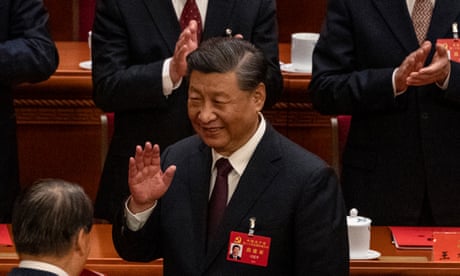- by foxnews
- 08 Apr 2025
China’s leader Xi Jinping secures third term and stacks inner circle with loyalists
China’s leader Xi Jinping secures third term and stacks inner circle with loyalists
- by theguardian
- 24 Oct 2022
- in news

Xi Jinping has been confirmed as leader of China for a precedent-breaking third term, after a week-long political meeting eliminated key rivals and strengthened his political power.
The 20th Party Congress, the most important meeting of the ruling Chinese Communist party five-year political cycle, saw about 2,400 delegates gather in Beijing to rubber-stamp major reshuffles and constitutional changes before its official close on Saturday.
At a press event on Sunday, seven key Xi loyalists were revealed as members of China's most powerful political body, the politburo standing committee (PSC), as they walked on stage in order of rank.
"I was reelected as the general secretary of the CPC central committee," Xi said in opening remarks, before presenting the six other members: Li Qiang, Zhao Leji, Wang Huning, Cai Qi, Ding Xuexiang, and Li Xi.
At the lead was Xi, confirming his reappointment as general secretary of the party for a third term. The long-speculated reappointment signalled Xi's successful and overwhelming consolidation of power in Beijing, with retention of the role as chair of the military commission, controlling the People's Liberation Army. It's expected he will next year regain the less powerful title of president.
Among the first world leaders to congratulate Xi were North Korean dictator Kim Jong Un, and Russia's Vladimir Putin, with whom Xi announced a limitless partnership earlier this year.
"The results of the Party Congress fully confirm your high political authority, as well as the unity of the party you lead," Putin said, according to the Kremlin.
As the second-ranked member after Xi, Li Qiang, the party secretary of Shanghai, is likely to be appointed the next premier when Li Keqiang steps down from premiership in March after two terms.
Shanghai has historically been a breeding ground for top national leaders. While Li's prospects might have been dented by the chaos of Shanghai's protracted Covid lockdown, analysts say Xi values loyalty and trustworthiness above all, and Li's strong rapport with Xi over the years has put him in good stead. Li was Xi's chief of staff from 2004 to 2007 when Xi was Zhejiang province's top party boss.
The relatively surprising inclusion of Cai Qi was a sign of how Xi values both loyalists and people he knew rising up through the ranks. Like Xi, Cai spent many years in Fujian province at the start of his career, and moved on to Zhejiang. More recently he oversaw the 2022 winter Olympics, and has been a prominent champion of the zero-Covid policy embraced by Xi, indicating that is here to stay for now.
The Standing Committee was formally selected by the powerful politburo, also revealed on Sunday. For the first time in 25 years the new politburo contains no women members where previously there was one, vice-premier Sun Chunlan, and has reduced in number to 24 from 25.
Willy Lam, a senior fellow at Jamestown Foundation, a Washington-based think tank said this week's Congress had shown that "the personality cult surrounding Xi will exacerbate".
"The party and country risk becoming a 'one-voice chamber' where only one voice will be heard. The supreme leader has almost totally abandoned the institutional reforms started by Deng Xiaoping and largely followed by ex-presidents Jiang Zemin and Hu Jintao," he said.
In his short speech on Sunday, Xi said China must remain on high alert for challenges "like a student sitting for a never-ending exam", repeating earlier warnings of "choppy waters" and "dangerous storms" on the horizon.
The language is heightened compared to previous Congresses, which were more focused on peace and development, and reflect how much more isolated China has become from the west, with numerous disputes and tensions. But he emphasises a need to keep relationships open.
"China's development can't leave the world and the world's development also needs China," he said.
In 2018 Xi spearheaded the abolition of presidential term limits on leaders, paving the way for him to become leader for life. Massive anti-corruption purges during his tenure, and this week's political reshuffles have ensured there is little, if any, opposition remaining.
A list of delegates appointed to the 205-member central committee on Saturday revealed some of the most senior rivals to Xi, with links to other factions in the party and their own power base, had been shuffled into retirement.
Resolutions announced on Saturday revealed constitutional changes enshrining Xi the individual and his political thought as the core of the CCP and its ideology, raising concerns of a growing Maoist "cult of personality" around Xi.
Separate amendments cemented Beijing's more aggressive stance on Taiwan in the party's constitution. Where it previously listed Taiwan alongside Hong Kong and Macau as a place with which to "build solidarity". It now only swears to "resolutely oppose and constrain Taiwan independence".
- by foxnews
- descember 09, 2016
Ancient settlement reveals remains of 1,800-year-old dog, baffling experts: 'Preserved quite well'
Archaeologists have recently unearthed the remarkably well-preserved remains of a dog from ancient Rome, shedding light on the widespread practice of ritual sacrifice in antiquity.
read more


